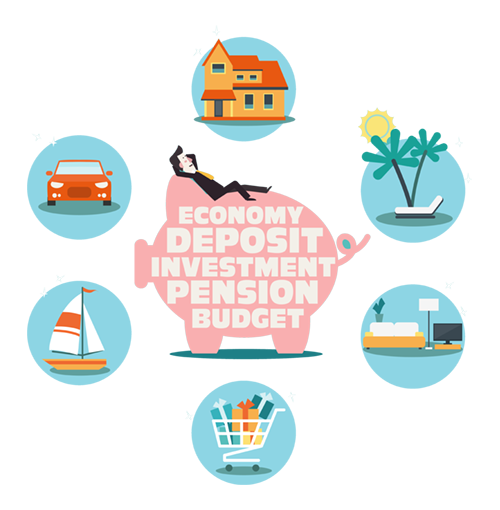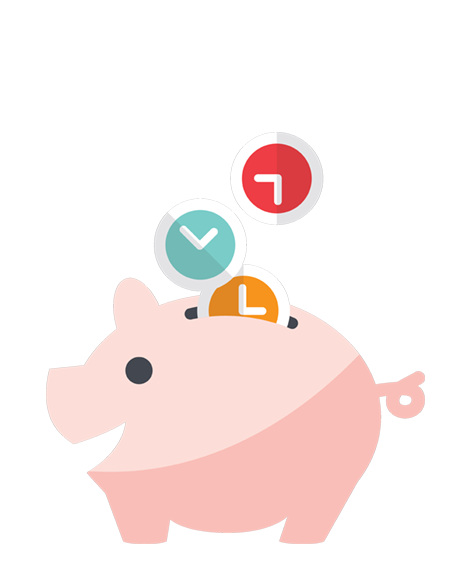Answers to
Practical Questions
Need some ideas on how to save a bit of money each week so that you can begin to invest?
The first thing you need to know or find out is where you are spending your money today, so you can identify potential savings. Several of the big Banks have excellent free tools on their online banking sites for this purpose.
For the tools to work, you will need a chequing account and a credit card from the same Bank. Try to put 100% of your spending on your debit card or visa card Most Banks have a no-fee credit card. Never carry a credit card balance, but that is a lesson for another day.

Using one major Bank as an example, sign into their online banking with your client card number and your password, (remember do not share your password with anyone, including TheAnswerIs, your bank, or any other institution or person).
These tools will categorize and summarize all the transactions going through your chequing account and your credit card.
You can set various time periods to analyze by clicking on the "Custom" drop-down menu.
The tool is handy as it recognizes most major merchants like Bell Canada and Loblaws, etc. and will correctly categorize these expenses automatically.
For smaller merchants, the tool will typically show "Uncategorized" and you can then click on "Uncategorized" and set the correct category. Once set, the tool will typically remember the merchant on all future transactions
Now you will know where you are spending your money, and more importantly, where you can look to save $10.00 per week or $520.00 per year (i.e., 52 x $10.00).
The tool is pretty handy as it recognizes most major merchants like Bell Canada and Loblaws, etc. and will correctly categorize these expenses automatically.
For smaller merchants, the tool will initially show "Uncategorized" and you can then click on "Uncategorized" and set the correct category. Once set, the tool will remember the merchant on all future transactions.
Now you will know where you are spending your money, and more importantly, where you can look to save $11.40 per week or $592.40 per year (i.e., 52 x $11.40).
Big Changes, Big Savings (with thanks to TheSimpleDollar.Com)
Find a cheaper place to live. Rent or a mortgage is probably your largest expense. Look for a cheaper place to live – ViewIt and Realtor.ca are great places to start. Consider a bigger place, but with a roommate, the cost per person drops. Or, if you have extra room, rent it out!
Drive a less expensive car. Cars are huge waste of money. If you need one, buy a fuel-efficient used car. Even a one-year-old car can save you 25% to 30% off the price of a new car.
If you need to drive, save some money on gas. Gasbuddy.com is an app that uses the built-in GPS on your phone to locate stations near you with the lowest gas prices.
Quit smoking. C'mon, this habit is not only bad for you, but if you invested the money it takes to buy a pack of cigarettes every day in equities at 10% per year instead of butts, you would have $673,000 in 30 years instead of a higher risk of cancer.


Be smart at the grocery store. First, use a grocery list – mundane but important. To make one correctly, first check out your grocery store flyer (online or paper) for this week’s specials, then do a seven-day breakfast, lunch, and dinner meal plan. Then only put items on the list you need for the seven-day meal plan. Save your meal plans and periodically repeat them to save yourself planning time. 'Plan to Eat' is a great online meal planning and list making tool. The list will prevent you from buying what you already have, (i.e., you forgot you already have bananas, milk or maple syrup), and you will eliminate impulse buys. Breakfast food is cheaper than lunch food and dinner food, so eat breakfast. Buy large use non perishable items in bulk, i.e., toilet paper, laundry detergent, shampoo, feminine supplies, Q-Tips, etc.
Checkout 51 is an app that gives you money back on certain products after you purchase them.
Watch less TV. How does this save you money? It buys you X hours per week to earn more income (see How can I earn at least $11.40 per week more so I can begin to invest?), reduces your cable subscription fees, uses less electricity, skips all those ads that make you want to buy stuff ... but giving you more free time to earn more is the big win.
Small Changes that Add Up Over Time
Check prices BEFORE you shop! Flipp.com is an app that allows you to search for a specific flyer OR more importantly, you can search for a product, such as TV, to see all the flyers that have it listed and for what price.
Just ask for the best price! My wife is the absolute best at this – at every store in a mall she goes into, she always asks, "Is this the best price you can do for me today?" About half the time she gets an instantaneous discount.
Visualize the Stop hand! If you want to buy a discretionary item, (i.e., something other than rent or groceries), once you think you have decided to make the purchase, show yourself the Stop hand for seven days. You might change your mind about needs versus wants.
Do not pay interest on your credit card! If you can't pay the full balance every month, or get and use a line of credit or traditional bank loan, you probably can't afford it - don't buy it.
Pack your lunch instead of buying fast food. Make extra when preparing dinner and save a portion for lunch.
Get a better cell phone package. If you have a Bell, Telus or Rogers cell phone, and you really don’t travel that much outside the city or across the country, check out Koodo and Wind Mobile rates.
Drink water. What?? Drink water? Yup – drink eight ounces before lunch and dinner and you will eat less and feel better. Add a wedge of lemon – your liver will thank you.

Persuade your employer to purchase a coffeemaker for the employees. Either your employer will volunteer to pay for the coffee and condiments or employees can pay $0.50 per cup to offset the costs –much cheaper than Tim's or Starbucks. If you must buy your own coffee to go, drink Tim's Dark Roast rather than Starbucks – it’s not a bad alternative and much cheaper.
For creative people only: Make your own homemade gifts, i.e., food mixes, condiment basket, candles, fresh-baked anything, natural soap, etc. Non-creative people like myself are easily impressed and appreciate other people’s creative skills.
Buy gifts and cards on sale. Buy next year’s Mother’s Day cards, Christmas wrapping, or Easter and Halloween decorations the day after, and hold them for a year. The savings outweigh tying up your money for one year.
Get utility smart (not rocket science smart). When you leave the room, turn off the lights. Also, if you pay for your own heat, get a programmable thermostat. This is not rocket science!
Avoid boredom. Boredom costs you money. If you’re bored on a Sunday morning, you risk shopping and spending just because you have nothing better to do. Try volunteering for a couple of hours each week. You’ll put the extra hours to good use, meet new people and make a difference in the life of someone who needs a helping hand. These new leads may also land you some extra employment opportunities.
Be insurance savvy. Increase the deductible on your auto and home insurance policies – just make sure you can afford to pay the higher deductible if you need to claim. Term life insurance is cheaper than whole life insurance – check to see what you have and make the exchange if applicable.
Stop collecting stuff and start selling stuff. Go through your closets and basement. If you haven't used something in a year, you can probably do without it, so sell it! Craigslist, Maxsold and Kijiji make it easy.

Fun Substitutes
Invite friends in rather than going out on the town.
Switch a dinner or movie night out with friends to dinner in watching each other's old DVDs.
Make your own beer and wine with friends.
Instead of taking a vacation requiring a plane, try a road trip.
Instead of going out for a massage, offer to give your partner one. It will come back one day.
Instead of buying books, CDs DVDs and magazines, borrow them from the library.
In the summer, walk or bike instead of taking public transit. If you drive, try walking and taking public transit instead of driving.
Check out your local city or town website to learn about free activities that are going on each weekend.
These are a few ideas to save you an extra $11.40 per week, or $592.40 per year, to support your long-term investing.
If you have other ideas you are willing to share on how to earn some money, please submit them via "Ask A Question".
If I use your suggestion, I will donate $20 to The Sanfilippo Children’s Research Foundation.
